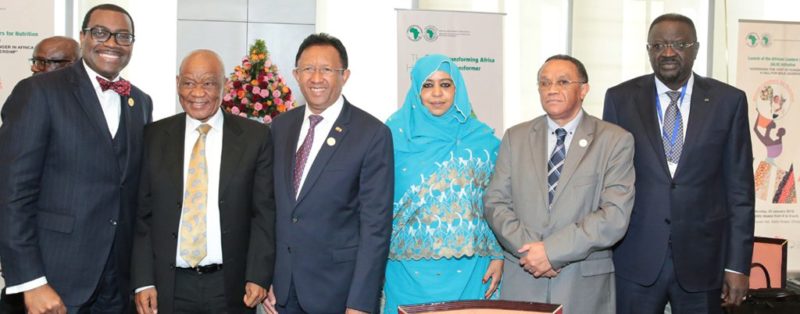African leaders on Monday, January 29, 2018 made a landmark commitment to remove nutrition-related barriers that prevent children and societies from realising their full potential.

The leaders made the commitments at the launch of African Leaders for Nutrition (ALN) − an initiative championed by the African Development Bank (AfDB) and the African Union Commission (AUC) – in Addis Ababa, where they agreed to jointly overcome malnutrition and elevate nutrition as driver for economic growth and sustainable development.
According to the President of the AfDB, Akinwumi Adesina, stunted children today will lead to stunted economies tomorrow. The impact of stunting is irreversible, but preventable.
Poor nutrition is responsible for stunting children’s growth, harming children’s educational development and future economic prospects. In 2016, 59 million African children suffered from stunting and 14 million suffered from wasting. Combined together, this is more than the population of France, more than the population of South Africa and seven times the population of Switzerland, Adesina warned.
“There’s every reason to care: poor nutrition is the main cause of death for millions of children under five. Indeed, three million children die every year in Africa from malnutrition. If current trends continue to 2030, Africa will have lost a mind boggling 36 million children because they didn’t have enough to eat or to eat well enough.”
The African Union has endorsed the African Leaders for Nutrition initiative and encouraged its champions to continue to dialogue and strengthen advocacy efforts in support of improved nutrition.
The Prime Minister of Lesotho, Motsoahae Thomas Thabane, read the resolution of African leaders on the ALN initiative, where they agreed that food security without improved nutrition will not deliver the desired inclusive socio-economic outcomes − especially as the number of those affected by hunger and malnutrition has not decreased over the past few years.
The declaration commended Member States who have made progress in ending child stunting and addressing underweight children and encouraged others to do the same.
“Nutrition is at the heart of our continental agenda and is a developmental issue. Nutrition security remains critical to all ongoing programmes and has a positive impact on development. Working together, we can make a difference,” said the Chair of the African Union Commission, Moussa Faki Mahamat, in a statement at the event.
President Adesina described Africa as the only region where the number of stunted children has increased, from 47 million in 1990 to 59 million in 2016.
“There is both a moral and economic obligation on us to resolve this utterly preventable African disaster. Africa can defeat stunting and malnutrition if its leaders align and leverage their combined will,” he told African leaders.
“So, today, I speak for the victims of the silent killer of life: malnutrition. God did not create kids’ stomachs to be empty. Nothing breaks our hearts more than a mother unable to calm the rumbling, hollow stomach of her hungry baby. A proverb in my Yoruba language says, ‘Elders cannot be in the marketplace and watch the heads of babies hang lose when strapped to the mothers back’.”
To the leaders, he said: “You are the elders. You cannot watch as three million babies die from malnutrition on the backs of equally malnourished mothers. We all need to hear the voices of these mothers and children and act without delay!”
He described ‘grey matter infrastructure’ as Africa’s most important infrastructure and stressed the determination of the African Development Bank to help Africa feed itself and become self-sufficient in food: nutritious food.
“The African Leaders for Nutrition initiative will keep a report card, an Africa Nutrition Accountability Score Card, which will rate countries scientifically on their progress in addressing malnutrition and building grey matter infrastructure. This policy innovation will build incentive to complement and strengthen the commitment. To achieve greater impacts on nutrition, governments should prioritise nutritional investments, through Nutrition-Sensitive Budgeting.”
The President of Madagascar, Hery Rajaonarimampianina, who presented an African Union Commission’s study on the Cost of Hunger in Africa (COHA), described malnutrition as one of the main barriers that prevent children and societies from realising their full potential.
“Stunted children fall ill more frequently – generating high health costs to families and the economy equivalent to between 1-30% of the total public budget allocated to health, or 3% of GDP. If we reduce current stunting rates by 50% by 2025, we can expect a saving of $21.7 billion; if we achieve the AU Malabo goal of reducing stunting to 10% and underweight children to 5% by 2025, we can expect a saving of up to $39.3 billion,” he said.
